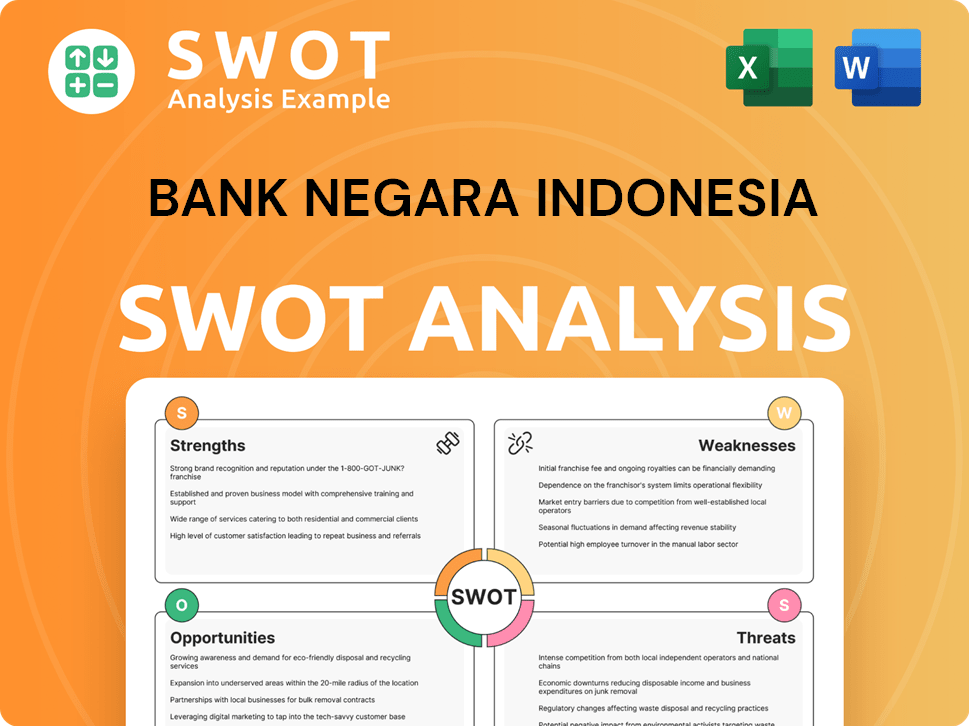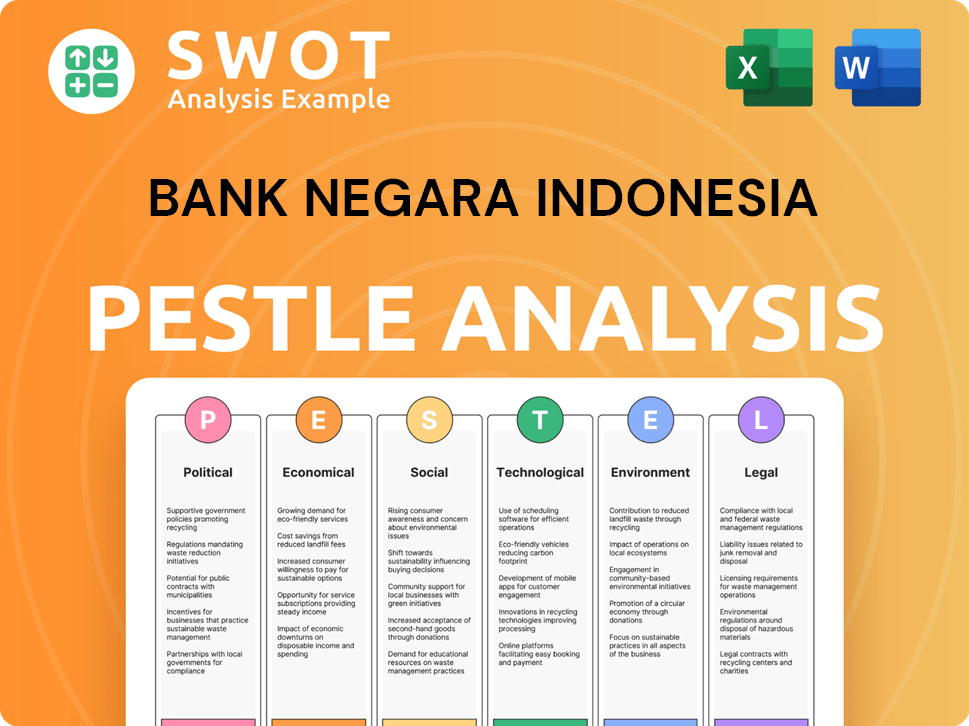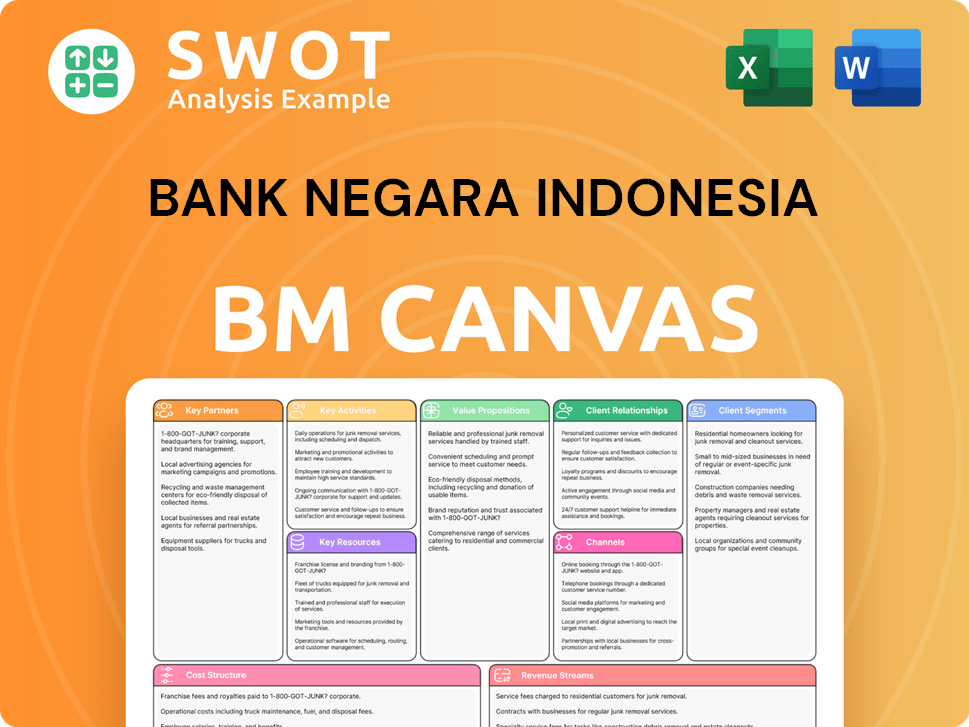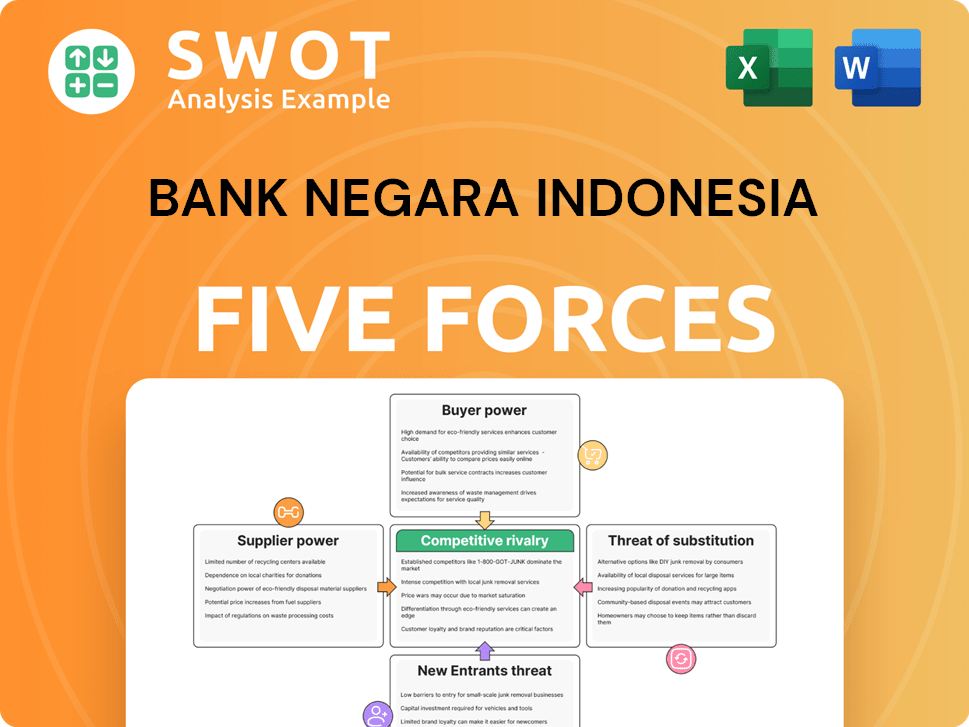Bank Negara Indonesia Bundle
Who Really Controls Bank Negara Indonesia?
Understanding the ownership structure of a financial giant like Bank Negara Indonesia (BNI) is crucial for any investor or strategist. From its inception as a state-owned entity to its current status as a publicly listed company, BNI's ownership has undergone a fascinating transformation. This evolution has significantly shaped its strategic direction and market influence. Uncover the intricacies of Bank Negara Indonesia SWOT Analysis to gain deeper insights.

The journey of BNI ownership reveals a pivotal shift from government control to a more diversified shareholder base. Knowing "Who owns BNI" is essential for assessing its long-term prospects and understanding the motivations behind its strategic decisions. As an Indonesian bank, BNI's ownership structure reflects its role in the nation's financial landscape. Exploring BNI ownership details allows for a comprehensive understanding of its governance and future trajectory, especially considering its recent financial performance and the influence of its major investors.
Who Founded Bank Negara Indonesia?
The story of Bank Negara Indonesia (BNI) began on July 5, 1946, marking a pivotal moment in Indonesia's financial history. Founded by the Indonesian government, BNI was established to support the newly independent nation's economic development. This early initiative laid the groundwork for what would become one of Indonesia's leading financial institutions.
Margono Djojohadikusumo was appointed as the first director, and Abdul Karim served as secretary. Initially, BNI operated as both a central and commercial bank. This dual role was crucial for the young nation, providing essential financial services and helping to establish Indonesia's financial independence. BNI's early actions, such as distributing the first official Indonesian currency, the ORI (Oeang Republik Indonesia), underscored its significance in the country's financial sovereignty.
The early years of BNI were marked by significant transitions. After the establishment of De Javasche Bank as the central bank in 1949, BNI shifted its focus to become a development bank. This evolution was accompanied by the authorization to operate as a foreign exchange bank, broadening its scope of operations. The bank's transformation continued in 1955, when its legal status was formally changed to a state-owned commercial bank through Emergency Law number 2 of 1955. This change helped solidify its position in the commercial banking sector.
Bank Negara Indonesia (BNI) was founded on July 5, 1946.
Initially, BNI served as both a central and commercial bank.
Margono Djojohadikusumo was appointed as the first director of BNI.
BNI distributed the first official Indonesian currency, ORI.
In 1955, BNI's legal status was changed to a state-owned commercial bank.
BNI opened its first foreign branch in Singapore in 1955.
Understanding the early ownership structure of Bank Negara Indonesia (BNI) is key to grasping its evolution. Initially, the Indonesian government founded and owned BNI, reflecting its role in supporting the nation's financial independence. Over time, BNI's structure evolved, but its core mission remained focused on supporting the national economy. For more insights, you can explore the Competitors Landscape of Bank Negara Indonesia.
- BNI was established by the Indonesian government.
- Early operations included both central and commercial banking functions.
- The shift to a development bank occurred after 1949.
- BNI's legal status was formalized as a state-owned commercial bank in 1955.
Bank Negara Indonesia SWOT Analysis
- Complete SWOT Breakdown
- Fully Customizable
- Editable in Excel & Word
- Professional Formatting
- Investor-Ready Format

How Has Bank Negara Indonesia’s Ownership Changed Over Time?
The ownership structure of Bank Negara Indonesia (BNI) has evolved significantly since its founding. Initially, the Indonesian government held complete ownership. A pivotal moment occurred in 1996 when BNI became the first state-owned bank in Indonesia to go public. This initial public offering (IPO) involved selling 25% of its equity to the public, and the bank was listed on the Jakarta Stock Exchange (now Indonesia Stock Exchange) and the Surabaya Stock Exchange. This move marked the beginning of a transition towards a more diversified ownership model.
The Indonesian government's stake in BNI has remained substantial. As of April 2025, the government holds a 60% stake, making it the majority owner. The remaining 40% is held by the public, including individual and institutional investors, both domestic and international. A recent development, as of March 2025, involved the transfer of the majority shares of state-owned enterprises, including BNI, to the Daya Anagata Nusantara Investment Management Agency (Danantara) through Government Regulation (PP) No. 16/2025. Danantara currently holds the 60% share in BBNI, managing the government's stake and directing SOE dividends to support direct investment funds and accelerate structural reforms.
| Shareholder Type | Shareholding Percentage (April 2025) | Notes |
|---|---|---|
| Government (via Danantara) | 60% | Majority shareholder |
| Domestic Public | 15.48% | Includes individuals, pension funds, and mutual funds |
| Foreign Shareholders | 24.52% | Primarily institutional investors |
The current BNI shareholders structure reflects a mix of public and private ownership. Domestic public ownership accounts for 15.48%, with domestic individuals holding 6.92%, pension funds 4.58%, and mutual funds 2.20%. Foreign shareholders constitute 24.52% of the total, with foreign institutions holding 24.51% and foreign individuals 0.01%. These changes, particularly the public listing and the transfer to Danantara, have aimed to strengthen BNI's financial structure and competitiveness. For more insights into the bank's strategic direction, consider exploring the Growth Strategy of Bank Negara Indonesia.
BNI's ownership has evolved from full government control to a mixed model with public and private shareholders.
- The Indonesian government remains the majority shareholder, holding 60% as of April 2025.
- 40% of BNI is publicly owned, with both domestic and foreign investors.
- The transfer of shares to Danantara aims to streamline dividend distribution and support SOE reforms.
- Understanding the BNI stock ownership structure is key for investors.
Bank Negara Indonesia PESTLE Analysis
- Covers All 6 PESTLE Categories
- No Research Needed – Save Hours of Work
- Built by Experts, Trusted by Consultants
- Instant Download, Ready to Use
- 100% Editable, Fully Customizable

Who Sits on Bank Negara Indonesia’s Board?
As of March 26, 2025, the leadership of Bank Negara Indonesia (BNI) is structured with Putrama Wahju Setyawan as President Director/CEO, beginning his tenure in April 2025, and Alexandra Askandar as Deputy President Director. The Board of Directors includes key figures overseeing various segments: Hussein Paolo Kartadjoemena (Finance & Strategy), Muhammad Iqbal (Commercial Banking), Agung Prabowo (Corporate Banking), Munadi Herlambang (Human Capital & Compliance), Abu Santosa Sudrajat (Treasury & International Banking), Rian Kaslan (Network & Retail Funding), Eko Setyo Nugroho (Institutions), Corina Leyla Karnalies (Consumer Banking), Toto Prasetio (Information Technology), and Ronny Venir (Operations).
The Board of Commissioners, also as of March 26, 2025, is led by Omar Sjawaldy Anwar as President Commissioner and Tedi Bharata as Vice President Commissioner. The other commissioners include Suminto, Donny Hutabarat, Vera Febyathy (Independent), and Didik Junaidi Rachbini (Independent). Tedi Bharata's background includes a previous role as Commissioner of PT Bank Mandiri (Persero) Tbk from 2024-2025 and is currently the Deputy for Human Resources, Technology, and Information at the Ministry of State-Owned Enterprises.
| Position | Name | As of |
|---|---|---|
| President Director/CEO | Putrama Wahju Setyawan | April 2025 |
| Deputy President Director | Alexandra Askandar | March 26, 2025 |
| President Commissioner | Omar Sjawaldy Anwar | December 2024 |
With the Indonesian government holding a 60% stake as of April 2025, the BNI ownership structure grants significant control to the government, primarily managed through the Daya Anagata Nusantara Investment Management Agency (Danantara). This majority ownership significantly influences strategic decisions and board appointments. The average tenure of BNI's board of directors is approximately 1.3 years, indicating a relatively new board. There have been no recent reports of proxy battles or activist investor campaigns concerning BNI, which is an Indonesian bank.
The Indonesian government's majority ownership of BNI, with a 60% stake, provides significant control over the bank. This ownership structure allows the government to influence strategic decisions and board appointments effectively.
- The government's shares are managed by the Daya Anagata Nusantara Investment Management Agency (Danantara).
- The Board of Directors has seen recent appointments, with Putrama Wahju Setyawan as CEO.
- The Board of Commissioners is led by Omar Sjawaldy Anwar.
- The average tenure of BNI's board of directors is relatively short at 1.3 years.
Bank Negara Indonesia Business Model Canvas
- Complete 9-Block Business Model Canvas
- Effortlessly Communicate Your Business Strategy
- Investor-Ready BMC Format
- 100% Editable and Customizable
- Clear and Structured Layout

What Recent Changes Have Shaped Bank Negara Indonesia’s Ownership Landscape?
Over the past few years, Bank Negara Indonesia (BNI) has seen significant shifts that have influenced its ownership structure. A notable move in 2022 was the acquisition of Bank Mayora, which BNI planned to transform into a digital bank focused on the MSME sector. Following the acquisition, BNI held a 63.9% stake in Bank Mayora, while Mayora Group's ownership decreased to 36.1%. In 2023, Bank Mayora was rebranded as Hibank. BNI also established BNI Ventures to enter the venture capital space, signaling its commitment to innovation and expansion.
Regarding BNI ownership, the company has engaged in share buyback programs. In February 2025, BNI's management allocated IDR 1.5 trillion to repurchase up to 10% of its outstanding shares. This buyback, approved at the Annual General Meeting on March 26, 2025, aims to provide long-term performance- and risk-based compensation to its board of directors and commissioners through a Management and Employee Stock Option Plan (MESOP) program. The MESOP program is scheduled to run for three years after the buyback is completed. By September 15, 2024, BNI had completed a buyback of 40.51 million shares.
The Indonesian banking sector, particularly for state-owned banks, is experiencing trends such as increased institutional ownership and a focus on digital transformation. BNI itself has been undergoing a multi-phase transformation program to enhance digital service delivery and operational efficiency, including the launch of 'Wondr by BNI' in 2024. The government's strategy, as seen with the establishment of Danantara in March 2025, suggests a move to centralize the management of state-owned enterprises' dividends to support direct investment funds and structural reforms. Moody's Ratings estimates BNI's profitability (return on assets) to be around 1.8% to 1.9% in 2025, maintaining robust capitalization and stable funding structures.
BNI's ownership structure primarily involves the Indonesian government as the majority shareholder. Other shareholders include institutional investors and the public.
The government's significant stake in BNI ensures its influence over strategic decisions, aligning the bank's objectives with national economic policies and development goals.
BNI is actively pursuing digital transformation initiatives, including the launch of new digital platforms and services to enhance customer experience and operational efficiency.
BNI has implemented share buyback programs to manage its capital structure and provide long-term incentives for its board of directors and employees.
Bank Negara Indonesia Porter's Five Forces Analysis
- Covers All 5 Competitive Forces in Detail
- Structured for Consultants, Students, and Founders
- 100% Editable in Microsoft Word & Excel
- Instant Digital Download – Use Immediately
- Compatible with Mac & PC – Fully Unlocked

Related Blogs
- What are Mission Vision & Core Values of Bank Negara Indonesia Company?
- What is Competitive Landscape of Bank Negara Indonesia Company?
- What is Growth Strategy and Future Prospects of Bank Negara Indonesia Company?
- How Does Bank Negara Indonesia Company Work?
- What is Sales and Marketing Strategy of Bank Negara Indonesia Company?
- What is Brief History of Bank Negara Indonesia Company?
- What is Customer Demographics and Target Market of Bank Negara Indonesia Company?
Disclaimer
All information, articles, and product details provided on this website are for general informational and educational purposes only. We do not claim any ownership over, nor do we intend to infringe upon, any trademarks, copyrights, logos, brand names, or other intellectual property mentioned or depicted on this site. Such intellectual property remains the property of its respective owners, and any references here are made solely for identification or informational purposes, without implying any affiliation, endorsement, or partnership.
We make no representations or warranties, express or implied, regarding the accuracy, completeness, or suitability of any content or products presented. Nothing on this website should be construed as legal, tax, investment, financial, medical, or other professional advice. In addition, no part of this site—including articles or product references—constitutes a solicitation, recommendation, endorsement, advertisement, or offer to buy or sell any securities, franchises, or other financial instruments, particularly in jurisdictions where such activity would be unlawful.
All content is of a general nature and may not address the specific circumstances of any individual or entity. It is not a substitute for professional advice or services. Any actions you take based on the information provided here are strictly at your own risk. You accept full responsibility for any decisions or outcomes arising from your use of this website and agree to release us from any liability in connection with your use of, or reliance upon, the content or products found herein.